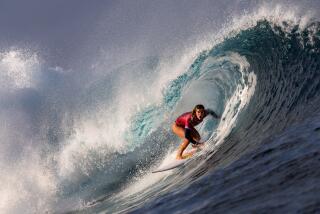Going for the Gold in Obfuscation, Verbosity
- Share via
It’s a shame that Irish writer Flann O’Brien died 28 years ago. I, for one, would relish reading the dispatches he might file from Lillehammer.
An indefatigable champion of the precise use of language, O’Brien used his column in the Irish Times to periodically publish “The Myles na gCopaleen Catechism of Cliche.” He described it as “a unique compendium of all that is nauseating in contemporary writing.”
Example:
What, as to the quality of solidity, imperviousness, and firmness, are facts?
Hard.
And as to temperature?
Cold.
And what is notoriously useless as a means of altering the hard facts of the situation?
All the talk in the world.
Go back to O’Brien’s description, drop the word writing and replace it with Olympics commentating and you’ll start to get my drift.
Sooner or later, all of the CBS-TV commentators have provided sterling contributions. With apologies to Myles, not to mention security in the knowledge that courts have consistently ruled that it is impossible to libel the dead, we humbly offer an update of the Catechism of Cliche as it applies to various events:
* Bobsledding:
What form of doubt or indecision must the contestants always avoid?
Hesitation.
And what quantity of hesitation is impermissible?
Even a little.
At what point in the race is the avoidance of same most critical?
At the start.
And in the unfortunate event a little hesitation at the start is displayed, what form of recompense will the perpetrators suffer?
It’ll cost them.
* Women’s Skiing:
Specifically where, and according to whom, is the entrant’s otherwise admirable vocabulary noticeably deficient?
Her coaches say she does not know the meaning of the words “defensive skiing.”
* Women’s Speed Skating:
Other than inhaling and exhaling, what do some skaters attempt in regard to respiration at the conclusion of a heat?
To catch their breath.
How recently have they tried this?
Still.
What aspect of unawareness does a long-shot’s victory in this event indicate? Surprise.
To what measure of surprise does a long-shot’s victory demonstrate these Olympic games to be infused?
Full.
These examples notwithstanding, no one is as generous in his or her offerings to the Catechism of Cliche as skater-turned-announcer Scott Hamilton in his descriptions of the figure skating:
* Pairs Figure Skating:
A successful performance in this event proves the entrants to be in possession of exactly what portion of “it”?
They have it all.
Precisely what three qualities constitute “it”?
The jump, the sparkle and the nerve.
What alliterative triumvirate of verbs contracted in the past conditional were conspicuously not exhibited by the Canadian team of Isabelle Brasseur and Lloyd Eisler?
No would’ve, could’ve or should’ve in tonight’s performance.
That notwithstanding, what axis of the time-space continuum, in combination with a preponderance of what body of methods and which particularly repetitive manifestation of preparedness did Brasseur & Eisler exhibit in abundance?
Technique, timing and practice, practice, practice.
* Men’s Figure Skating:
In what relative physical proximity were the parents of one entrant following their son’s substantially less-than-ideal preliminary performance?
Beside themselves.
By which quality of disappointment were they accompanied?
With grief.
Of what vintage and class of skater does Russian gold-medal winner Alexei Urmanov belong?
A new breed.
What feat, successfully executed, distinguishes this new breed?
A quadruple jump.
And in what depository usually reserved for holding weapons or munitions is this rare deed stored?
In his arsenal.
To what sufficiency, quantity or amount of satisfaction have viewers, and now our faithful readers, been subjected?
Enough.
More to Read
Go beyond the scoreboard
Get the latest on L.A.'s teams in the daily Sports Report newsletter.
You may occasionally receive promotional content from the Los Angeles Times.






